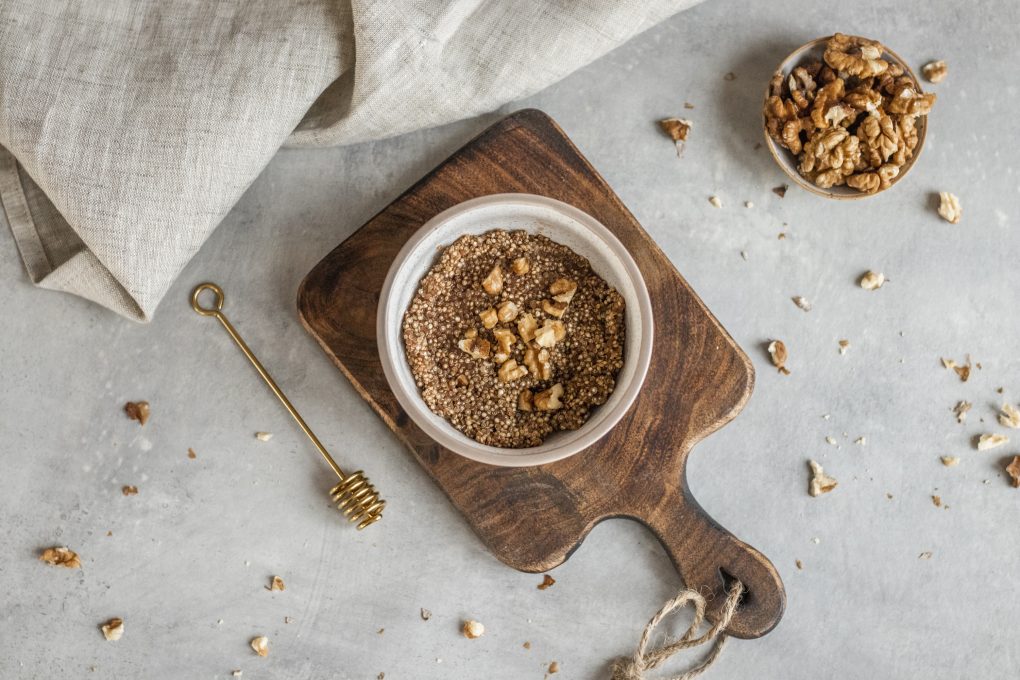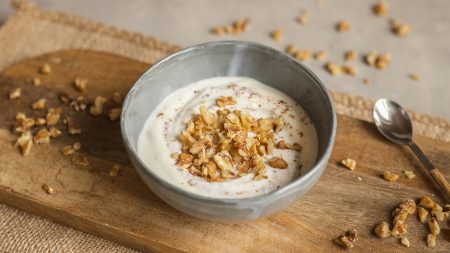
Nuts for Better Health
Walnuts, hazelnuts, cashews, Brazil nuts or maybe macadamia? Yes! We are talking about nuts, which means nutritious minerals and fats that must be included in your diet. Let’s get to know all the interesting facts about the types of nuts and their positive impact on our body.
Snacks with nuts and seeds are becoming more and more popular. The good news is that a healthy lifestyle is gaining in popularity and a lot of people tend to go for healthy snack replacements with nuts as the main ingredients are nuts. They are a healthy source of energy and nutrition. What’s more, they also taste great, so they are often added to breakfast products, e.g. granola, muesli, as well as desserts and bread.
Nuts are FRUITS!
Yes! Did you know that nuts are fruits? Their edible part is the seeds, and the pericarps are dry, hard, and inedible. A characteristic feature of the chemical composition of nuts is a high content of fat (about 60-63%) and protein (15-18%), as well as a high energy value of about 640 kcal/100g. It should be emphasized that nuts should be served in a small amount per serving and are a very healthy, good source of kilocalories, even for people who watch their weight.
A Handful of Facts
The health-promoting effect of nuts has been thoroughly tested. Scientific research proves that they have a significant impact on the circulatory system – they reduce the risk of coronary heart disease, type 2 diabetes or hypertension. Therefore, include them in your diet every day. Why such a request? Nuts contain an exogenous amino acid – arginine, which is a precursor of nitric oxide and regulates blood pressure, which is why they are recommended in the so-called hypertension DASH diet, which is available in Super Menu catering.
Nutritional Value of Nuts
Edible nuts (peanut, brazil, hazelnut, macadamia, almond, cashew, pecan, pine, pistachio, walnut) belong to a group of food products that are increasingly included in a balanced and healthy diet.
Nuts are dry fruit, the water content does not exceed 10 g per 100 g of product. Cashews, hazelnuts and peanuts have the highest amount of water, and macadamia nuts contain the least amount – only 1.4 g / 100 g.
Enrich Your Diet with Vegetable Protein
Nuts are an excellent source of vegetable protein – popular peanuts, as well as almonds and pistachios, win in this respect. Pecans and macadamia nuts have the lowest protein content. Interestingly, cashews and pistachios are characterized contain protein with a full composition of exogenous amino acids
You have probably heard lots of times about the happiness hormone, i.e. serotonin. So, the tryptophan in nuts, which is necessary for the production of the serotonin neurotransmitter, is the highest in almonds and the lowest in macadamia nuts. So almonds will definitely do the job to improve your mood!
Nuts are said to have a beneficial effect on reducing the risk of atherosclerosis for a reason. This is all due to the fact that they have a better ratio of arginine to lysine (more arginine) than in meat (more lysine), which reduces the risk of hypercholesterolemia in the body (disorders of the lipid profile, and more precisely, too high cholesterol).

A Source of Healthy Fat
Nuts are an excellent source of the kind of fat that is essential for our body, i.e. unsaturated fatty acids. We find here mainly monounsaturated fatty acids (MUFA) and polyunsaturated fatty acids (PUFA).
The dominant MUFA in all nuts is oleic acid – the largest amount found in hazelnuts. Walnuts, on the other hand, contain the largest amounts of n-6 and n-3 PUFA.
Nuts are high in calories, however, it is a healthy portion of good quality energy, so you do not have to be afraid of them in your diet. Pecan nuts are particularly rich in fat, while cashews contain the lowest amount of fat. Therefore, frequent consumption of nuts, thanks to the content of phytosterols (plant sterols), is associated with a reduced risk of cardiovascular disease and other health problems such as diabetes, excess weight and obesity. What’s more, they also strengthen the immune system! I don’t think I need to encourage you any more to eat them every day.
Vitamins and minerals
Nuts are rich in minerals. Nuts provide lots of minerals, and 100 g of some of them can fully cover the recommended daily requirement for some elements!
Almonds and Brazil nuts are good sources of calcium. Cashews, on the other hand, are a source of iron, Brazil nuts and cashews – magnesium, and pine nuts – zinc. In addition, Brazil nuts are also a source of selenium, which is increasingly recommended in people with diagnosed thyroid diseases. Interestingly, cashews and brazil nuts contain copper, which promotes the absorption of iron. Manganese is found in pine nuts and hazelnuts.
Another advantage is that the sodium levels in unprocessed nuts are very low, ranging from undetectable amounts for pecans and hazelnuts to 18mg/100g for peanuts. This is important for people with blood pressure problems and/or on a low sodium diet.
Nuts are a rich source of thiamine (vitamin B1) and vitamin B6. For example, 100 g of macadamia nuts will cover the recommended daily intake of vitamin B1 (i.e. 1.2 mg). The same amount of pistachios covers the recommended daily requirement for vitamin B6 (1.7 mg).
Hazelnuts and almonds are an excellent source of vitamin E (α-tocopherol), and their recommended serving (42 g) covers over 100% of the recommended daily intake (8-10 mg) of this vitamin for adults. They contain 33.1 mg and 25 mg of vitamin E/100g, respectively, and thanks to such a high content, they protect the body against the action of free radicals, thus counteracting i.a. aging processes.

Nuts Affect Your Brain
It is said that the walnut resembles the shape of the brain and it actually has a very positive effect on improving memory, concentration and even brain efficiency! It’s called brainfood. Consumption of nuts can partially cover the norm for the demand for some bioelements, which is why they greatly affect the balance of a healthy diet. These nutrients affect the maintenance of healthy blood vessels and reduce oxidative stress. The melatonin and polyphenols contained in nuts have a neuroprotective effect, i.e. they protect your neurons against the adverse effects of free oxygen radicals. The minerals in the fruit are involved in the synthesis of neurotransmitters in the central nervous system, affecting your brain, good energy and healthy, restful sleep.
And Now a Peanut Puzzle!
Did you know that the popular peanuts are not actually nuts? In fact, in the proper classification, they belong to legumes, like chickpeas, peas or beans, because their seeds are hidden in the pods. In terms of nutritional value, they have a similar chemical composition and properties to nuts. Apart from the great taste of nut spread which is great for making your sweet breakfast even more delicious, there is unfortunately one more issue: they can cause an allergic reaction, because they contain a very large amount of proteins – 32 proteins, 18 of which may have an allergenic effect.

What is the Recommended Daily Serving of Nuts?
Both in the prevention and dietotherapy of diseases, it is recommended for adults to consume nuts daily in amounts of about 30 to 50 g / day.
And most importantly, now read carefully, the FDA, i.e. the US Food and Drug Administration, has issued a health statement that the consumption of about 42 g / day of nuts, or about one handful (mainly walnuts) can reduce the risk of cardiovascular disease! However, the DAA (Dietitian Association of Australia) recommends a standard of 30 grams – this is equivalent to a daily amount of 20 almonds or hazelnuts or a handful of mixed nuts. It is so good to eat them!
Summary
Nuts are the quintessence of taste, health and variety. They are a group of foods with high energy and nutritional value. They contain large amounts of tocopherol, phenolic compounds and selenium, thanks to which they have strong antioxidant properties.
Although they are so healthy, you should be careful with the amount due to their high caloric content, which is why it is recommended to consume the recommended amount per day. Seeing the described nutritional values of individual types of nuts, it is worth consuming different types. As a result, we will provide our body with a range of different beneficial substances.
Nuts are great as a healthy snack and as an addition to breakfast recipes, both sweet and savory. You can find them in the delicious meals in my Diet&Training by Ann application and in the Super Menu offer, because nuts are a staple in a balanced diet. Enjoy!
Bibliography:
- Biernat J.,Drzewicka M., Łoźna K., Hyla J., Bronkowska M., Grajeta H. Skład kwasów tłuszczowych orzechów i nasion dostępnych aktualnie w handlu w kontekście prozdrowotnych zaleceń żywieniowych. Bromat. Chem. Tokykol. – XLVII, 2014, 2, str. 121 – 129.
- de Souza, R., Schincaglia, R. M., Pimentel, G. D., & Mota, J. F. (2017). Nuts and Human Health Outcomes: A Systematic Review. Nutrients, 9(12), 1311.Mikołajczak N. Składniki mineralne w orzechach występujących w składzie „mieszanek studenckich” = Minerals in nuts which are components of „Trail Mix”. Journal of Education, Health and Sport. 2016;6(9):832-840.
- Gonçalves B., Pinto T., Aires A, Morais M.C., Bacelar E i in. Composition of Nuts and Their Potential Health Benefits—An Overview. Foods. 2023 Mar; 12(5): 942.
- Stróżyk A. Orzechy jako istotny składnik diety sportowców. Probl Hig Epidemiol 2016, 97(4): 328-334.
- Stróżyk A., Pachocka L., Znaczenie orzechów w prewencji cukrzycy typu Diabetologia Praktyczna 2017, tom 3, nr 1.










Comments No Comments
Join the discussion…